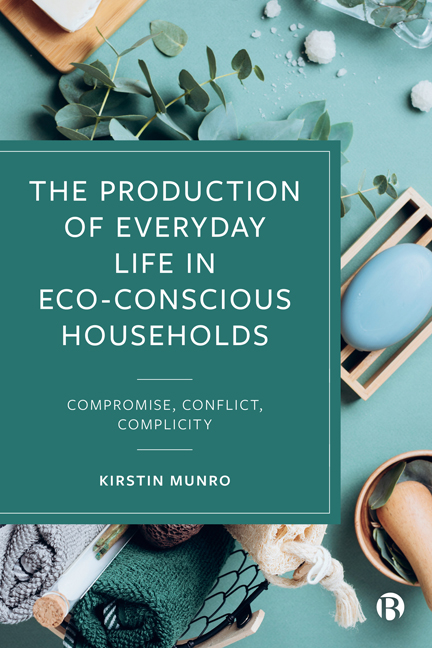Book contents
- Frontmatter
- Dedication
- Contents
- Acknowledgments
- 1 Introduction: “This Can’t Be All Up to Me”
- 2 Eco-Conscious Household Production and Capitalist Society
- 3 Priorities in Eco-Conscious Households
- 4 Resources and Constraints in Eco-Conscious Households
- 5 Managing Household Waste
- 6 Cleanliness and Comfort
- 7 Doing Their Own Research
- 8 Conflict
- 9 “How Do We Live with Ourselves?”
- 10 Conclusion: “We Have Met the Enemy and He Is Us”
- Notes
- Index
2 - Eco-Conscious Household Production and Capitalist Society
Published online by Cambridge University Press: 18 January 2024
- Frontmatter
- Dedication
- Contents
- Acknowledgments
- 1 Introduction: “This Can’t Be All Up to Me”
- 2 Eco-Conscious Household Production and Capitalist Society
- 3 Priorities in Eco-Conscious Households
- 4 Resources and Constraints in Eco-Conscious Households
- 5 Managing Household Waste
- 6 Cleanliness and Comfort
- 7 Doing Their Own Research
- 8 Conflict
- 9 “How Do We Live with Ourselves?”
- 10 Conclusion: “We Have Met the Enemy and He Is Us”
- Notes
- Index
Summary
In this chapter, I will present a version of the Marxist-feminist theoretical framework that I originally outlined in my 2019 article in the journal Science & Society. This chapter is admittedly dry and somewhat out of step with the rest of the book. If you are less theoretically oriented and more interested in the description of mundane practices I promised you in the Introduction, you can feel free to skip this chapter without missing too much. However, for theoretically oriented readers interested in the debates in Marxist-feminism or household production, this chapter is for you.
I initially developed this model based on what I learned from my ecoconscious informants during the ethnographic interviews I conducted in the spring of 2017. While it is somewhat a cliché that parents of young children are tired, I was nonetheless struck by just how exhausted my informants were. Even the most affluent among them, who had substantial extended family and/or paid assistance with everyday household tasks, were struggling to cope. And even the low-income single mothers in my sample told me that they most needed more time rather than more money. I realized that these households were making substitutions of time for money in producing a version of everyday life that felt more in line with their environmental values. Not only that, but they were taking on additional time-consuming tasks, such as recycling sorting, in order to avoid or “undo” environmental damage from other sites, scales, and sectors. At the same time, my informants were generally deeply dissatisfied with what they perceived to be the overall ineffectiveness of these interventions—no matter how many time-consuming changes they made to their everyday practices, it felt like a drop in the bucket. The environment is still being destroyed, and many of my informants were acutely aware of their complicit role in this destruction despite their best efforts.
Having been trained somewhat paradoxically in both Marxist-feminist and neoclassical theories of household production in graduate school, I was able to draw on these seemingly contradictory frameworks to help me explain what I uncovered in my interviews. As I will explain, other existing theoretical frameworks would point to more reformist or redistributionoriented solutions to the problems and concerns of my informants.
- Type
- Chapter
- Information
- The Production of Everyday Life in Eco-Conscious HouseholdsCompromise, Conflict, Complicity, pp. 22 - 39Publisher: Bristol University PressPrint publication year: 2023

